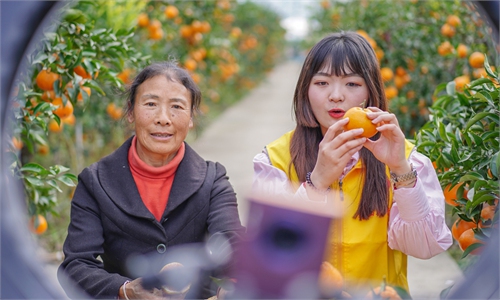Political advisors in Zhejiang suggest establishing college to teach livestreaming to promote sales of agricultural products

Viya introduces products during a livestream show in April. Photos: VCG
Political advisors from the Committee of China Democratic League in East China's Zhejiang Province, also called Zhejiang Minmeng, proposed to establish colleges for live hosts in local counties to help promote local agricultural products amid the battle against COVID-19.
The proposal was made during a meeting of the provincial people's political consultative conference. The announcement follows the tax evasion scandals of various livestreamers, including one of the most popular on the internet called Viya, as the country is tightening regulations on the industry.
According to a report from thepaper.cn on Wednesday, the proposal calls for introducing famous live hosts to counties to help farmers sell their products via livestreaming.
It also suggests establishing a livestreaming base and college to cultivate local live hosts and provide one-stop service for the livestreaming industry.
Amid the impact of the COVID-19 pandemic since 2020, e-commerce has grown into a vital channel for Chinese farmers to reach the market. Chinese ministries of finance and commerce also respectively released a joint notice to help the agricultural industry better integrate with e-commerce during the epidemic in February, 2020.
According to industry analysis reports, the sales of agricultural products on e-commerce platforms exceeded 600 billion yuan ($95 billion) in 2020, while the figure was about 170 billion yuan in 2017.
Livestreaming will be a tendency for online sales of agricultural products, reports said.
Officials in China have been promoting agricultural products on livestreaming platforms which has recently become a new phenomenon. Li Yuguo and other officials from Mengyin county, East China's Shandong Province, have been selling agricultural products via livestreaming since March, 2020, winning national praises for their efforts to help local farmers amid the pandemic.
Several foreign ambassadors to China also made appearances in livestreaming sessions to promote products from their countries. In November 2021, a livestream session organized by China Media Group helped sell 120,000 cans of hand-peeled pine nuts from Afghanistan, with transactions hitting more than 10 million yuan ($1.56 million), underscoring efforts to help Afghans overcome their economic difficulties.
According to reports, one quarter of 3,650 respondents to a survey conducted in July, 2021, said they would watch a livestream to help farmers sell products. Among the purchasers of agricultural products via livestreaming, more than 98 percent of the respondents said that the attractiveness and interestingness of the livestreamer is a major reason for their decision to purchase the products or not.
Zhejiang is a major hub for China's e-commerce and livestreaming industries as the e-commerce giant Alibaba is based in Hangzhou, capital of the province.
The province in 2020 issued the country's first management regulation as well as first training and evaluation regulation for livestreamers.
Many livestreamers are based in Hangzhou, including Viya, who was fined 1.34 billion yuan ($210 million) in December, 2021 for dodging taxes by the taxation authority in Hangzhou.
It is the largest fine ever imposed on a livestreamer, and market observers said that the case is a benchmark that will promote the healthy and sustainable development of the industry with stronger supervision, and it proves that no one can cross the legal line, no matter what industry they are in.
Global Times


